Summer Tires vs All-Season Tires: A Deep Dive into Tire Selection
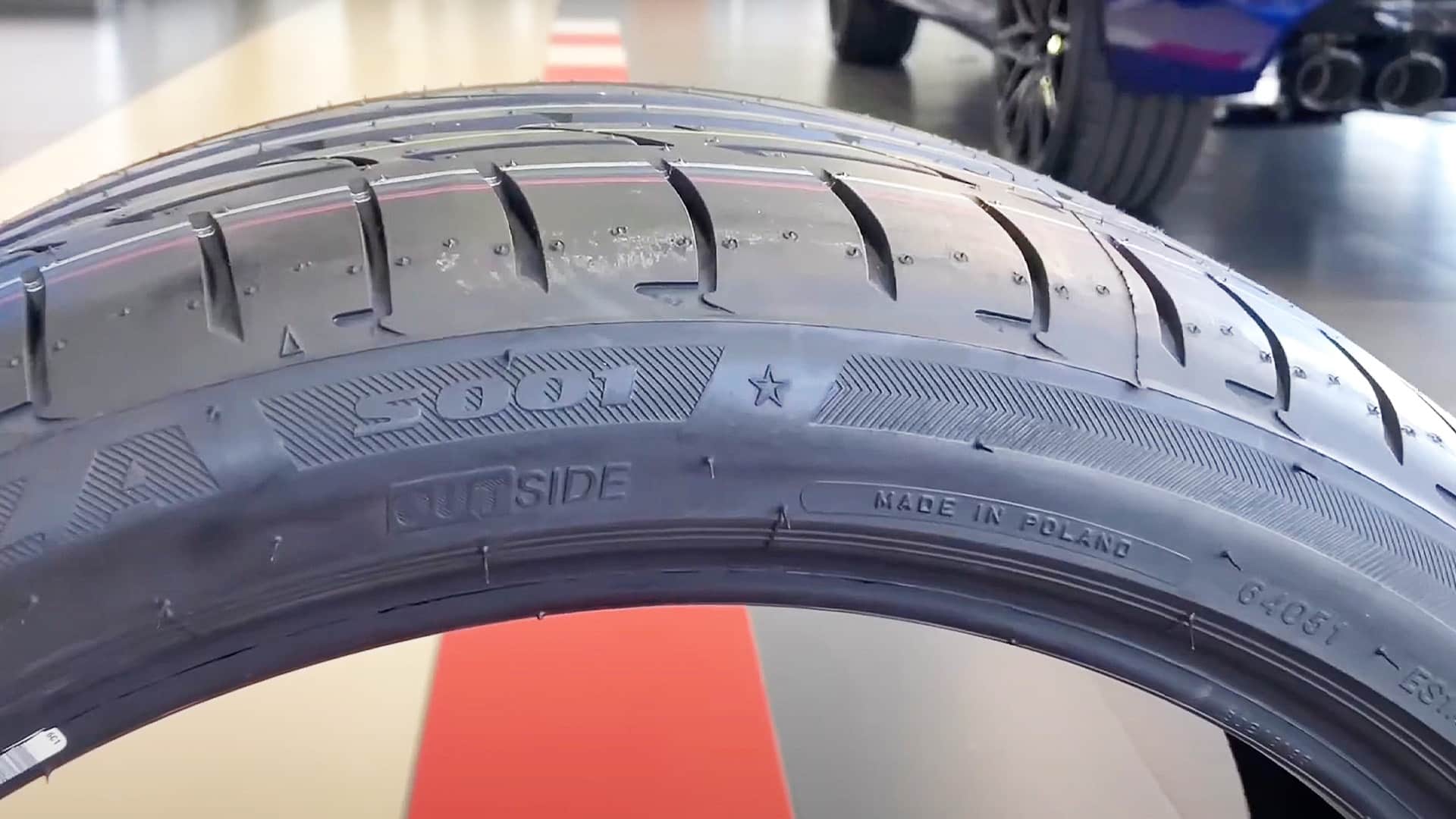
All-season tires are the most popular go-to choice for both new vehicles and tire replacements. They’re versatile and cater to most drivers’ needs. However, many performance cars come equipped with summer tires which can tempt drivers into making a switch.
It’s important to remember that each tire type has its own set of pros and cons. There isn’t an ideal tire for every situation or season, so it’s beneficial to understand their strengths and weaknesses. Let’s break it down.
Key Takeaways: Summer Tires vs All-Season Tires
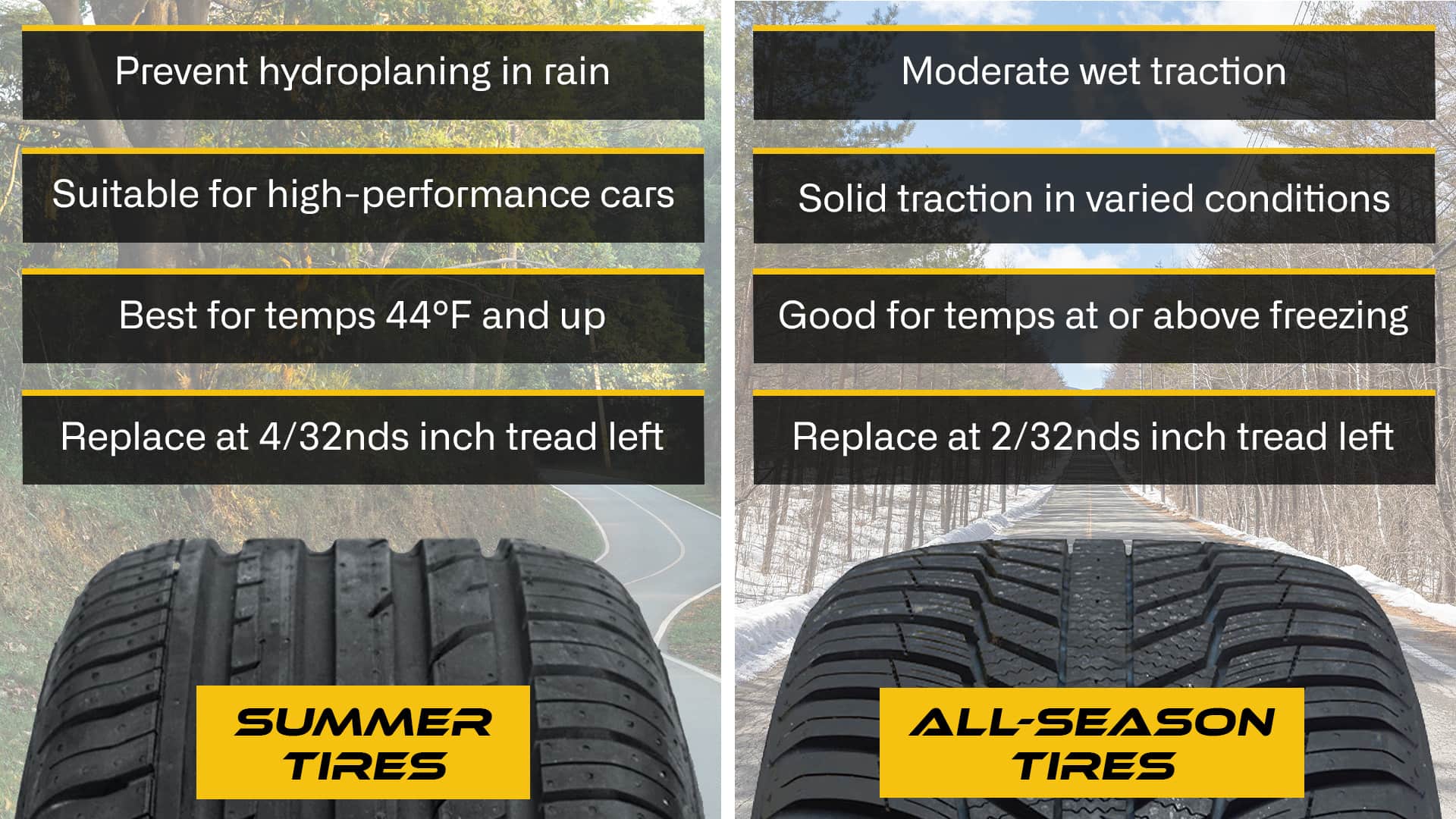
| Summer Tires | All-Season Tires | |
|---|---|---|
| Thrill Factor | Great cornering, acceleration, and braking. Ideal for spirited driving and high-performance vehicles. | Designed for solid traction in a wide range of conditions but not for performance handling. |
| Temperature Range | Recommended for use when the average daily temperatures are 44º F and above. | Suitable for temperatures at or above freezing. |
| Vehicle Type | Great for high-performance vehicles such as EVs, sports cars, and luxury SUVs. | Suitable for passenger cars, SUVs, CUVs, and light trucks. |
| Type of Driving | Ideal for spirited drivers and sports car owners. | Suitable for everyday drivers and those who occasionally face snow and ice. |
All-Season Tires
All-season tires mix features from winter and summer tires and can be used throughout the year. Sounds great, right? These types of tires offer a balance of capabilities by providing decent performance on wet and dry roads while also having traction in snow.
All-season tires were designed for the average driver and have reasonable tread depths with rubber compounds specifically made to last longer than summer tires.
In warm weather conditions, all-season tires perform well but may not have as much grip as summer tires which affects steering precision and other factors like braking and cornering. It’s essential to understand that this is an acceptable trade-off for all-season tires to keep acceptable performance levels during mild winter climates while maintaining long-lasting tread life.
Summer Tires
Summer tires, as you’d expect, are the perfect option for those hot summer months, They’re created specifically for temperatures above 45°F and have a shallow tread pattern with a firm and sticky tread compound allowing them to offer excellent grip on dry and wet surfaces.
Summer tires aren’t just about handling warm weather; they’re also built for speed and agility, making them ideal for high-performance vehicles.
Their specialized tread patterns and rubber compounds maximize precision when it comes to responsiveness, cornering, and braking capabilities.
The shallow groove concept of the treads put more rubber in contact with the road to provide maximum road-holding grip on both dry and wet roads.
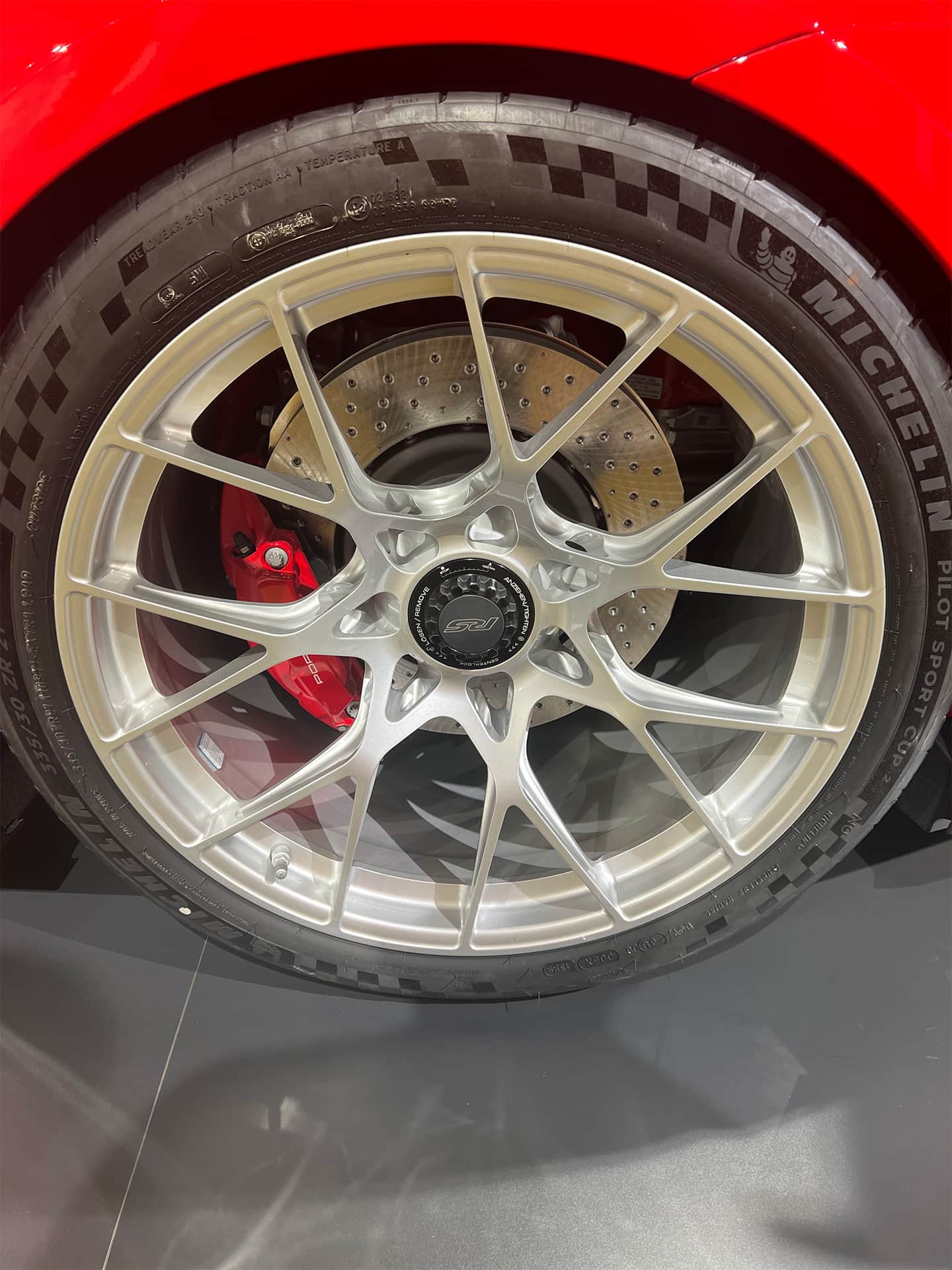
Which One Should I Choose?
If you’re wondering whether you need summer tires, it all depends on where you live and the driving experience that matters to you!
If you reside in an area with warm climates where snow is rarely a concern and temperatures consistently stay 44°F and above, then summer or performance tires might be perfect for your vehicle.
In urban areas with warm climates subject to occasional rainfall, performance tires could provide excellent handling capabilities that also reduce the risk of hydroplaning at highway speeds compared to all-season tires.
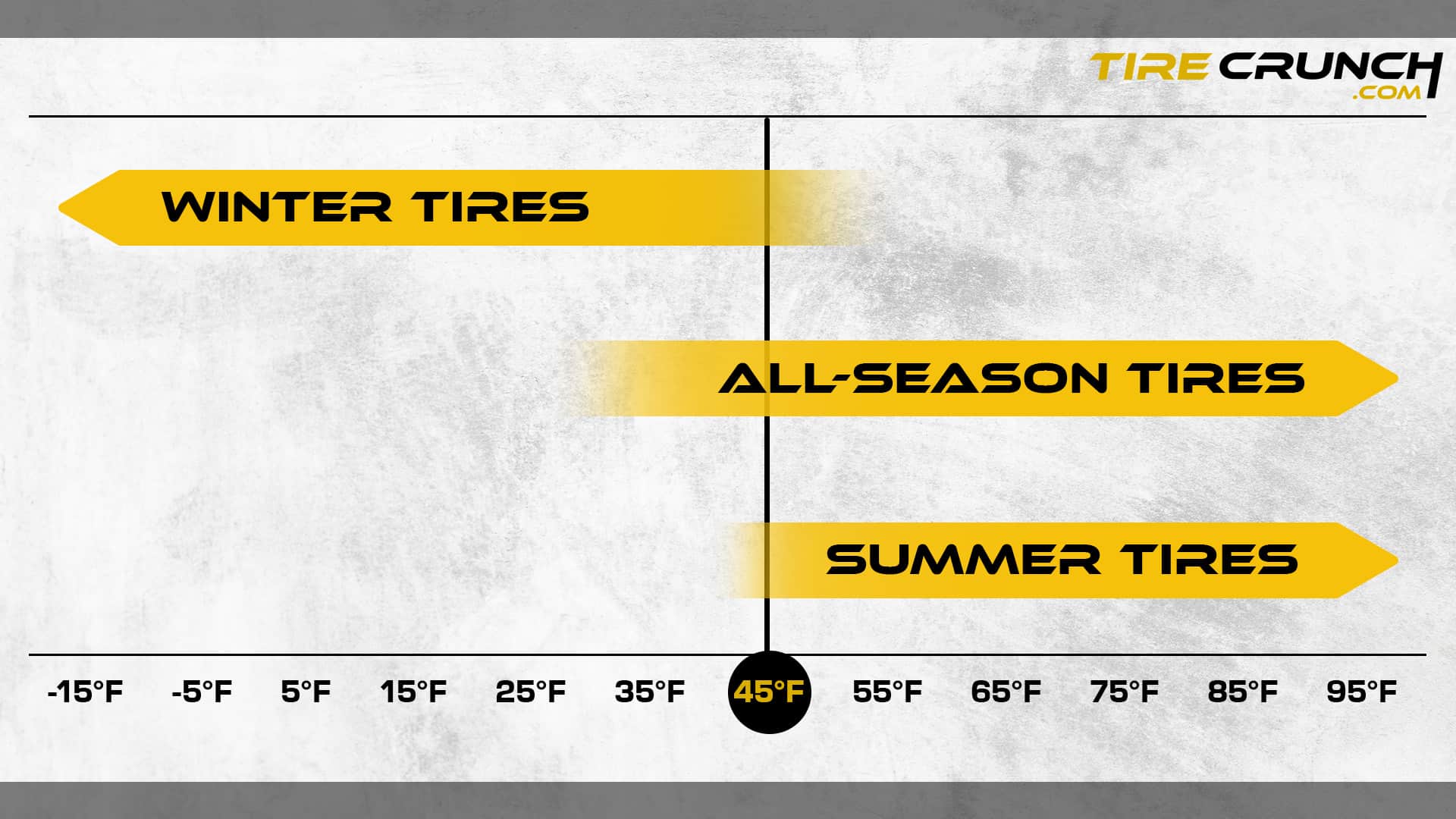
However, if you live in more unpredictable weather conditions or where light snow can occur unexpectedly throughout the year, it’s better to go with all-season tires as they’re designed to provide maximum grip on different terrains year-round.
If frequent encounters with ice and snow are part of your driving experience yearly- then Winter tires may become a crucial addition providing optimal traction under frozen surfaces ensuring safer driving conditions. When winter passes by – switch over to all-season or performance tires during springtime.
How long do summer tires last compared to all-season tires?
According to the research from The Drive, all-season tires generally provide roughly 60,000 miles of tread life while summer tires may only give you around 25,000 miles.
Can You Use Summer Tires Year-Round?
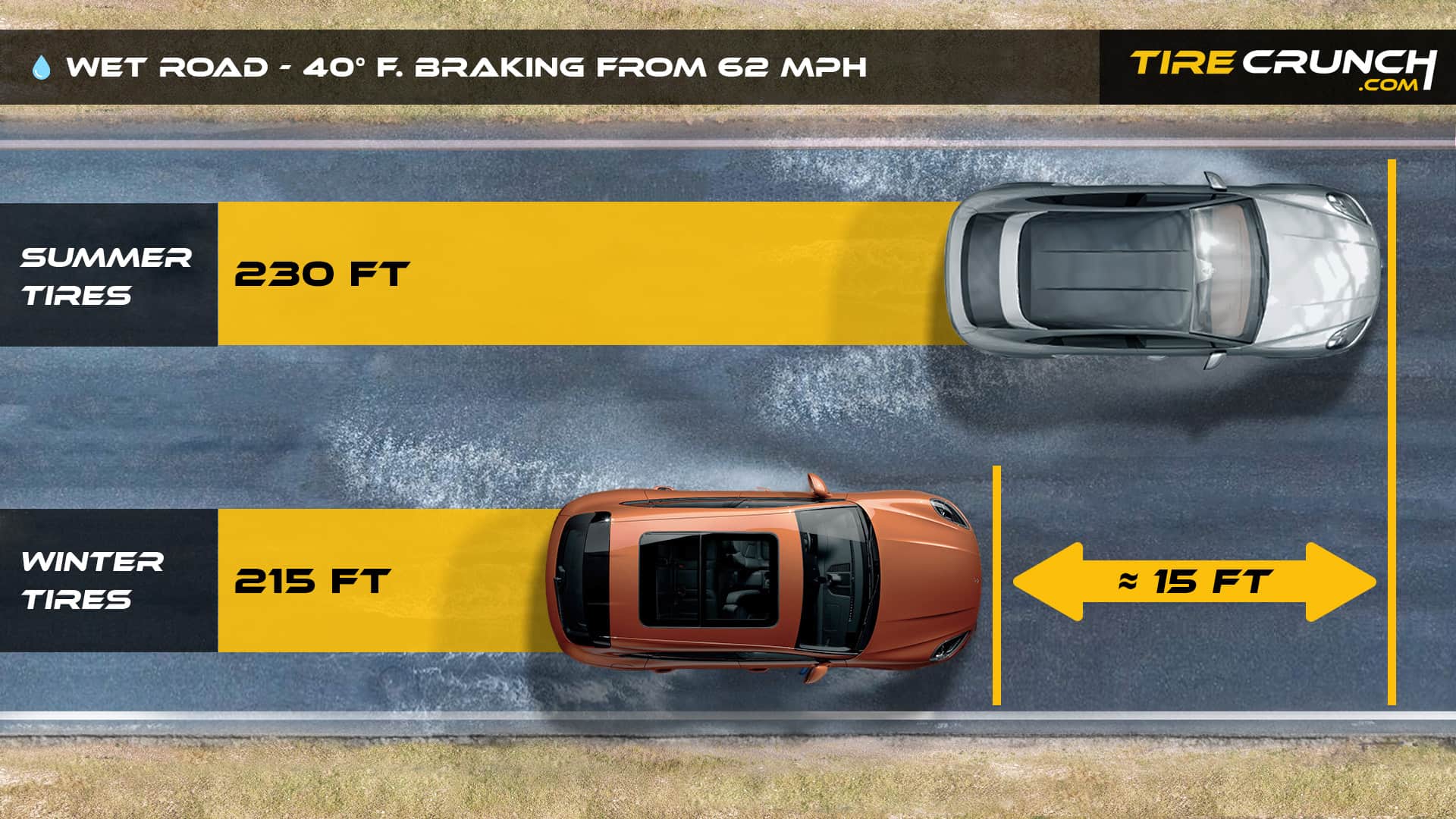
While summer tires are exceptional in warm temperatures, they do have their limitations. The rubber compound featured in summer tires is purpose-built for hot weather conditions while also providing excellent grip on both dry and wet roads.
However, as soon as the temperature drops below 40°F, your summer tires become hard and less flexible leading to limited handling capabilities and reduced traction.
Moreover, the design of a summer tire also makes it unsuitable for harsh winter conditions. With wider grooves covering less tire surface, you won’t have enough gripping power when driving through slush or ice. Hence, its performance can decline dramatically if driven during those colder months.
Related Reading: Can You Drive On Summer Tires During The Cold Months?
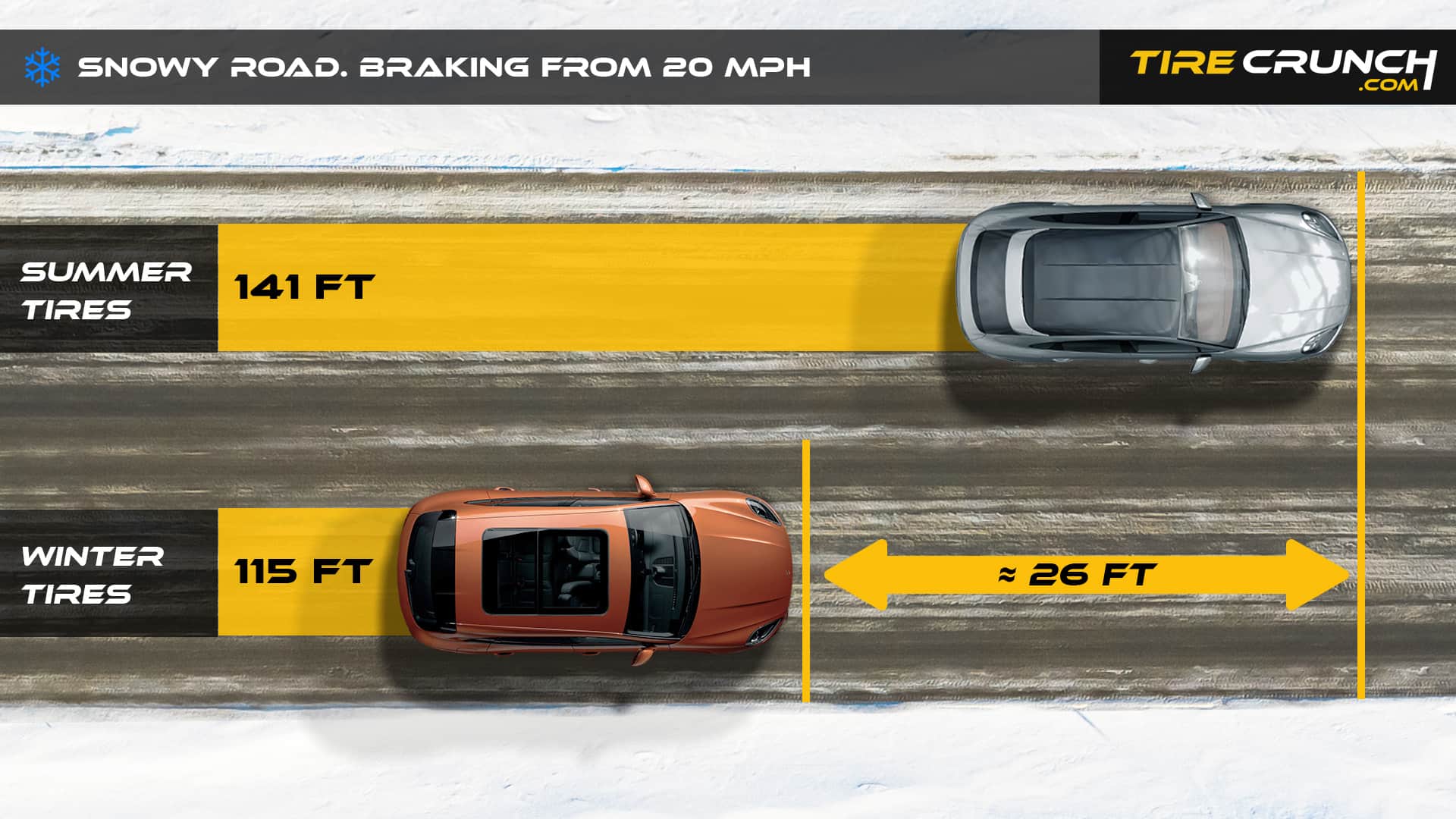
Of course, there’s always exceptions to these numbers, but generally speaking; summer tires have a shorter lifespan than all-seasons.
Are all-season tires safe in the winter?
While all-season tires are a great choice for round the year use, including light wintery conditions, they aren’t as suitable as winter when it comes to handling harsh winter weather.
In moderate snow, they can still provide good general traction, but slushy snowy roads and icy conditions can prove challenging as these type of tires lack specific cold-weather features that specialized tires include.
FAQs
Do All-Season Tires Wear Faster Than Summer Tires?
The difference between these two tire types is the depth of their treads. All-season tires come with deeper treads compared to summer options, allowing them to offer more longevity than summer technology.
When To Switch Winter Tires With Summer Tires?
When considering a changeover from winter tires to summer tires, the general rule of thumb is that it’s time to switch your winter tires for your summer tires once the temperature stays above 45°F on a consistent basis.
It’s best to look out for this consistency as you can still experience cold spikes or even snow during early spring. So mark your calendars and be sure to swap wheels as soon as possible!
Are Summer Tires Harder Than All-Season Tires?
The hardness of tires is typically dependent on ambient temperatures and the amount of heat that comes from the road itself.
Summer tires are specifically designed to maintain shape and integrity in warmer weather conditions, as they utilize specific rubber compounds engineered to provide optimal performance at higher temperatures.
On the other hand, all-season tires require an entirely different set of attributes. They’re built with a unique rubber compound that keeps them flexible at any temperature just above freezing, allowing for optimal traction performance, and handling capabilities while also providing exceptional braking abilities.
Are Summer Tires Quieter Than All-Season Tires?
In general, yes; summer tires tend to be quieter than their all-season counterparts!
This is primarily because of the unique design with fewer tread slits or sipes built into the tire pattern, which leads to a reduction in pattern noise while on the road.
This makes them a popular choice for hybrid and electric vehicles where sound perception is essential, given that these types of vehicles often produce less engine noise.
Are All-Season Tires The Same As All-Weather Tires?
Both tire types offer traction and handling capabilities across varying weather conditions throughout the year, but All-Weather tires are engineered with severe winter condition standards in mind.
They’re designed to maintain optimal performance no matter how bad road conditions may seem like it’s raining or even when it’s snowing outside.
On the other hand, All-season tires aim at achieving an optimal balance of elements such as long-lasting treads, comfort driving experience, and good grip on roads during dry summer seasons also maintaining stable handling during mild winter climates.
So, while these two tire technologies share some characteristics, their unique engineering attributes differentiate them significantly in their overall purpose.
